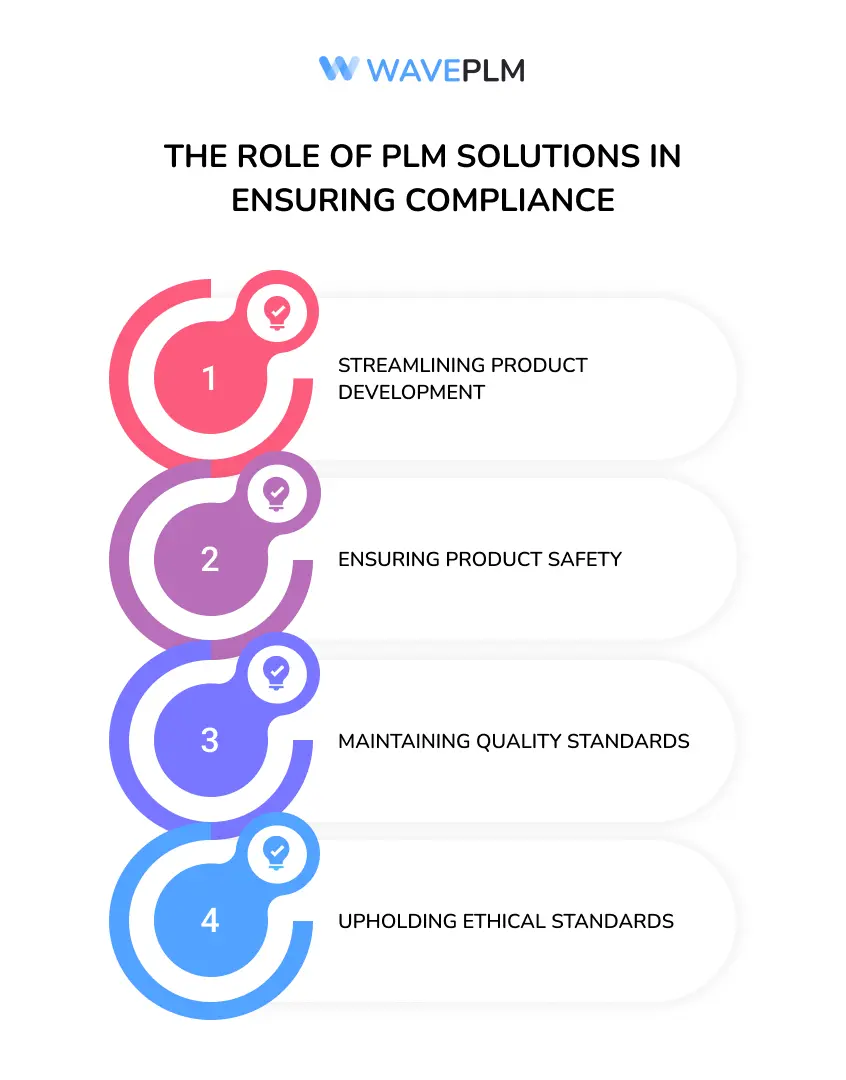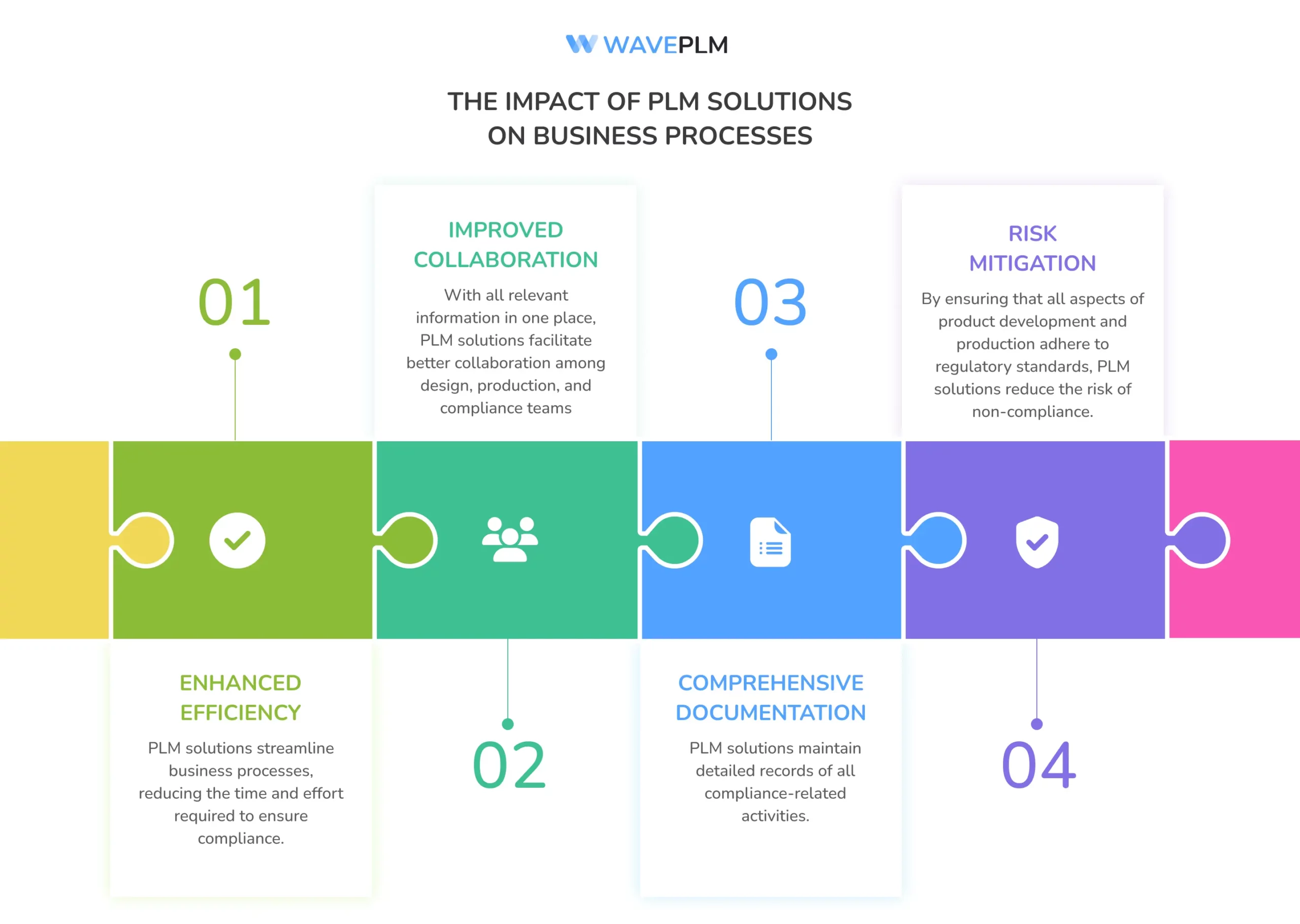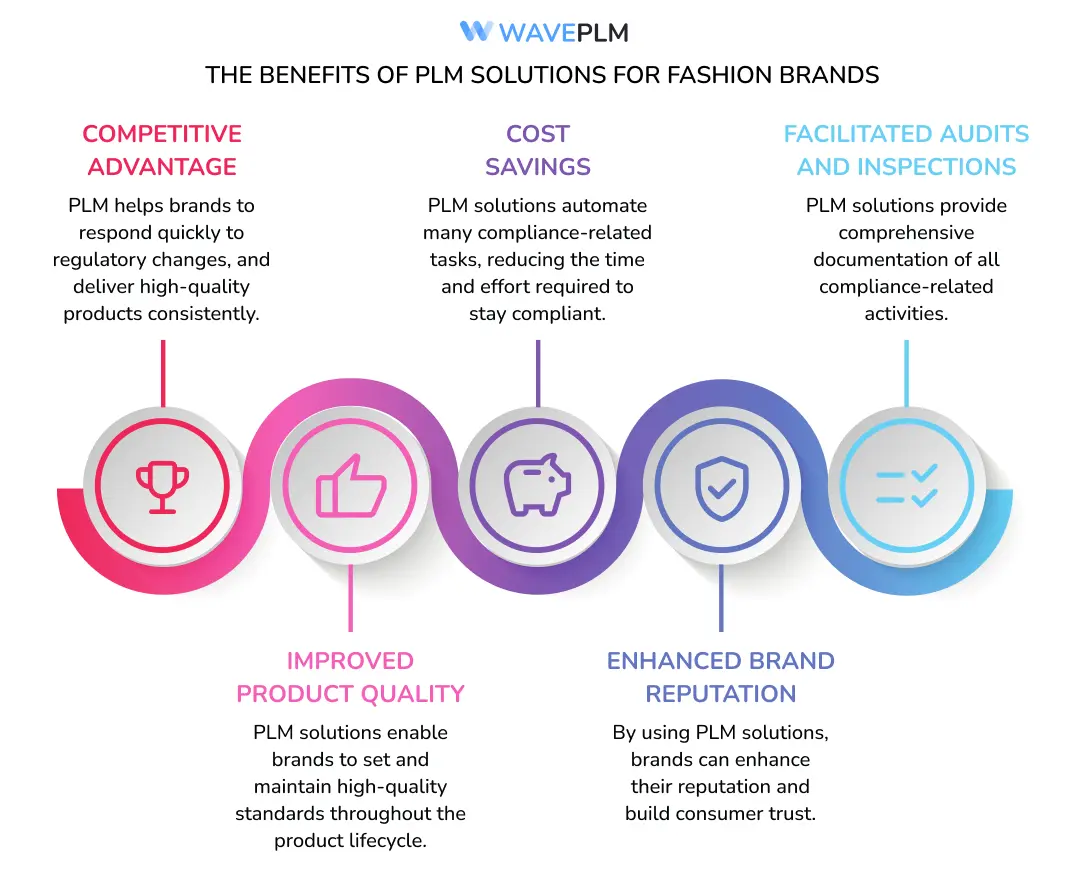
In the fast-paced and highly competitive world of fashion, ensuring that products meet stringent regulatory requirements is a complex and often challenging task. From maintaining product safety to adhering to quality and ethical standards, fashion brands must navigate a myriad of laws and regulations to remain compliant.
This is where Product Lifecycle Management (PLM) software become invaluable. PLM solutions are sophisticated tools that help fashion brands streamline their business processes, ensuring compliance with safety, quality, and ethical standards while reducing time to market.
Understanding Regulatory Compliance in Fashion
Regulatory compliance in the fashion industry covers a broad spectrum of requirements. These include product safety regulations, quality standards, ethical considerations such as labor practices, and environmental impact. Additionally, compliance extends to adherence to laws like the General Data Protection Regulation (GDPR) for managing customer data.
Brands must ensure that their products are not only stylish and market-ready but also safe for consumers and produced ethically. Failure to comply with these regulations can result in significant fines, recalls, and damage to brand reputation.
The Role of PLM Solutions in Ensuring Compliance
Streamlining Product Development
PLM solutions centralize all aspects of product development, from initial design to final production. This centralization ensures that all team members have access to the latest information and can collaborate effectively. By maintaining a single source of truth, PLM solutions reduce the risk of errors and ensure that all regulatory requirements are met throughout the product lifecycle. This streamlined approach is crucial for reducing time to market, allowing brands to respond swiftly to market demands and regulatory changes.
Ensuring Product Safety
Product safety is a primary concern in the fashion industry. PLM solutions help brands manage safety compliance by integrating regulatory standards into the product development process. This includes tracking materials and components to ensure they meet safety standards, performing necessary tests, and maintaining comprehensive records for audits.
Compliance officers play a vital role in this process, ensuring that all safety protocols are followed and that any potential issues are addressed promptly. By using PLM solutions, brands can ensure that their products are safe for consumers, thereby avoiding costly recalls and protecting their reputation.
Maintaining Quality Standards
Quality is non-negotiable in the fashion industry. PLM solutions enable brands to set and monitor quality standards at every stage of production. By providing tools for quality management, from design specifications to final inspections, PLM solutions ensure that products meet both brand and regulatory standards. This comprehensive approach to quality management helps brands deliver high-quality products consistently, enhancing customer satisfaction and loyalty.
Upholding Ethical Standards
Ethical standards are increasingly important to consumers and regulators alike. PLM solutions help brands ensure that their supply chains are ethical and sustainable. This includes tracking the origins of materials, verifying labor practices, and managing environmental impact. By integrating these considerations into the PLM system, brands can ensure compliance with ethical standards and demonstrate their commitment to responsible business practices. This transparency is crucial for building consumer trust and meeting the expectations of modern, socially-conscious consumers.

The Impact of PLM Solutions on Business Processes
Enhanced Efficiency
PLM solutions streamline business processes, reducing the time and effort required to ensure compliance. By automating tasks and providing real-time updates, PLM solutions allow brands to respond quickly to regulatory changes and maintain compliance effortlessly. This enhanced efficiency is critical in the fashion industry, where the ability to bring products to market quickly can provide a significant competitive advantage.
Improved Collaboration
With all relevant information in one place, PLM solutions facilitate better collaboration among design, production, and compliance teams. This improved communication helps prevent misunderstandings and ensures that everyone is working towards the same compliance goals. By fostering a collaborative environment, PLM solutions enable teams to work more effectively and efficiently, ultimately improving the overall quality and compliance of the products.
Comprehensive Documentation
PLM solutions maintain detailed records of all compliance-related activities. This documentation is crucial for audits and inspections, providing evidence that the brand meets all regulatory requirements. Having comprehensive records readily available also simplifies the process of updating or renewing compliance certifications. This level of documentation not only helps brands stay compliant but also provides valuable insights into their operations, enabling continuous improvement.
Risk Mitigation
By ensuring that all aspects of product development and production adhere to regulatory standards, PLM solutions reduce the risk of non-compliance. This proactive approach helps prevent costly fines, recalls, and damage to the brand’s reputation. Compliance officers use PLM solutions to monitor and manage compliance risks effectively, ensuring that potential issues are identified and addressed before they become major problems. This risk mitigation is essential for protecting the brand and maintaining consumer trust.

The Role of Government Agencies and Regulations
Federal Agencies and Compliance
Federal agencies play a crucial role in setting and enforcing compliance regulations in the fashion industry. These agencies establish the standards that brands must adhere to, covering areas such as product safety, quality, and ethical practices. PLM solutions help brands stay compliant with these federal regulations by integrating the necessary standards into their business processes. Compliance officers work closely with federal agencies to ensure that their brands meet all regulatory requirements and stay up to date with any changes in the laws.
General Data Protection Regulation (GDPR)
In addition to product-related regulations, brands must also comply with data protection laws such as the General Data Protection Regulation (GDPR). GDPR sets stringent requirements for how brands manage and protect customer data. PLM solutions help brands ensure compliance with GDPR by providing tools for data management and security. This includes tracking customer data, managing consent, and ensuring that all data processing activities comply with GDPR requirements. By using PLM solutions, brands can avoid the severe penalties associated with GDPR violations and protect their customers’ privacy.
Environmental Regulations
Environmental regulations are another critical area of compliance for fashion brands. These regulations aim to minimize the environmental impact of the fashion industry by promoting sustainable practices. PLM solutions help brands comply with environmental regulations by providing tools for tracking and managing their environmental impact. This includes monitoring the use of sustainable materials, reducing waste, and minimizing carbon emissions. By integrating environmental considerations into their business processes, brands can not only comply with regulations but also demonstrate their commitment to sustainability.
The Benefits of PLM Solutions for Fashion Brands
Competitive Advantage
By streamlining business processes and ensuring compliance with regulatory requirements, PLM solutions provide fashion brands with a significant competitive advantage. Brands can bring products to market faster, respond quickly to regulatory changes, and deliver high-quality products consistently. This ability to stay ahead of the competition is crucial in the fast-paced fashion industry, where trends change rapidly and consumer expectations are high.
Cost Savings
Ensuring compliance with regulatory requirements can be a costly and time-consuming process. However, by using PLM solutions, brands can reduce these costs significantly. PLM solutions automate many compliance-related tasks, reducing the time and effort required to stay compliant. Additionally, by preventing compliance issues and avoiding costly fines and recalls, PLM solutions help brands save money in the long run.
Improved Product Quality
PLM solutions enable brands to set and maintain high-quality standards throughout the product lifecycle. This comprehensive approach to quality management ensures that products meet both brand and regulatory standards, resulting in high-quality products that satisfy consumers. By delivering consistently high-quality products, brands can enhance customer satisfaction and loyalty, driving long-term success.
Enhanced Brand Reputation
In today’s socially-conscious market, consumers expect brands to adhere to high ethical and environmental standards. By using PLM solutions to ensure compliance with these standards, brands can enhance their reputation and build consumer trust. This positive reputation is crucial for attracting and retaining customers, particularly in a competitive market where consumers have many options to choose from.
Facilitated Audits and Inspections
PLM solutions provide comprehensive documentation of all compliance-related activities, making audits and inspections much easier. Brands can quickly and easily provide the necessary documentation to demonstrate compliance with regulatory requirements. This level of transparency not only simplifies the audit process but also helps build trust with regulators and other stakeholders.

Conclusion
To sum up, in the ever-evolving fashion industry, navigating regulatory compliance is essential for maintaining product safety, quality, and ethical standards. PLM solutions provide a comprehensive and efficient way for fashion brands to manage these complex requirements. By integrating PLM solutions into their operations, fashion brands can streamline business processes, reduce time to market, and also ensure compliance with all relevant laws and regulations.
Additionally, PLM solutions offer numerous benefits, including enhanced efficiency, improved collaboration, comprehensive documentation, and effective risk mitigation. By leveraging the power of PLM solutions, fashion brands can not only navigate the complexities of regulatory compliance but also set themselves apart as leaders in product safety, quality, and ethical standards.
In a competitive market where consumer expectations are high, and regulatory requirements are stringent, PLM solutions provide fashion brands with the tools they need to succeed. By ensuring compliance with safety, quality, and ethical standards, PLM solutions help brands protect their reputation, enhance customer satisfaction, and drive long-term success. With the support of PLM solutions, fashion brands can also confidently navigate the regulatory landscape and focus on what they do best—creating stylish, high-quality, and ethically-produced products that consumers love.





Leave a Reply